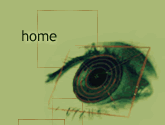|
|
|
Michael:
You have to rely rather heavily on aspects of your memory. It's harder
for you to skip around as you read (listening to a tape or your computer's
screen reader), so it's more important to remember the essentials
of the text as you go. Similarly, misplacing something can turn into
much more of an ordeal for you. Do you think your memory has improved
as sight has diminished?
|
|
Joel:
I wouldn't say my memory has literally improved, though I do
use it more conscientiously than when I could see well. Many
believe when someone loses their sight, memory and other faculties
become enhanced. I think this notion is a hopeful idealization
of blindness inspired equally by compassion and subconscious
fear of going blind, oneself. But sighted actors memorize copious
scripts, and they're not all Homers or Miltons. Still, I must
admit that I know where nearly everything in my apartment is,
and I do indeed recall salient facts and passages from my "reading,"
often verbatim. But I always have enjoyed vivid, fairly accurate
|
|

Joel
on his apartment
|
|
|
retention
of past events, conversations, sights, and sounds. I use it
more now than ever, of necessity, but I doubt there have been
dramatic alterations in my brain's neurochemistry or neurocircuitry.
Just bursts of frequent, intensive activity in memory areas.
|
|
|
Michael:
I know that music and literature are two of your greatest passions.
How do you keep track of where CDs and books are, or remember what's
inside them, without being able to read titles or thumb through pages?
Have you developed any tricks or technologies to help catalogue and
remember all that visual information?
|
|

Joel
on books
|
|
Joel:
I periodically have friends straighten my bookshelves, just
on principle. As Henry Grunwald, former Time executive and US
Ambassador, afflicted with macular degeneration, says in his
memoir, "Twilight," the books in my living room aren't just
furniture now, but they aren't what they used to be, either.
Music is something else, though. Whereas I don't often wish
to reread a printed book or a passage of one, or at least can
stomach not being able to, I really need to know where my CD's
are. I don't read Braille, or I might label every CD with Braille
Dymo tape. I posed my problem to a couple of blind Internet
mailing
|
|
lists, and got innovative ideas for everything from shelving
strategies to powerful database programs that list title and
track information when you insert a music disc in your CD-ROM
drive. Not sure what I'll do, yet.
|
|
|








